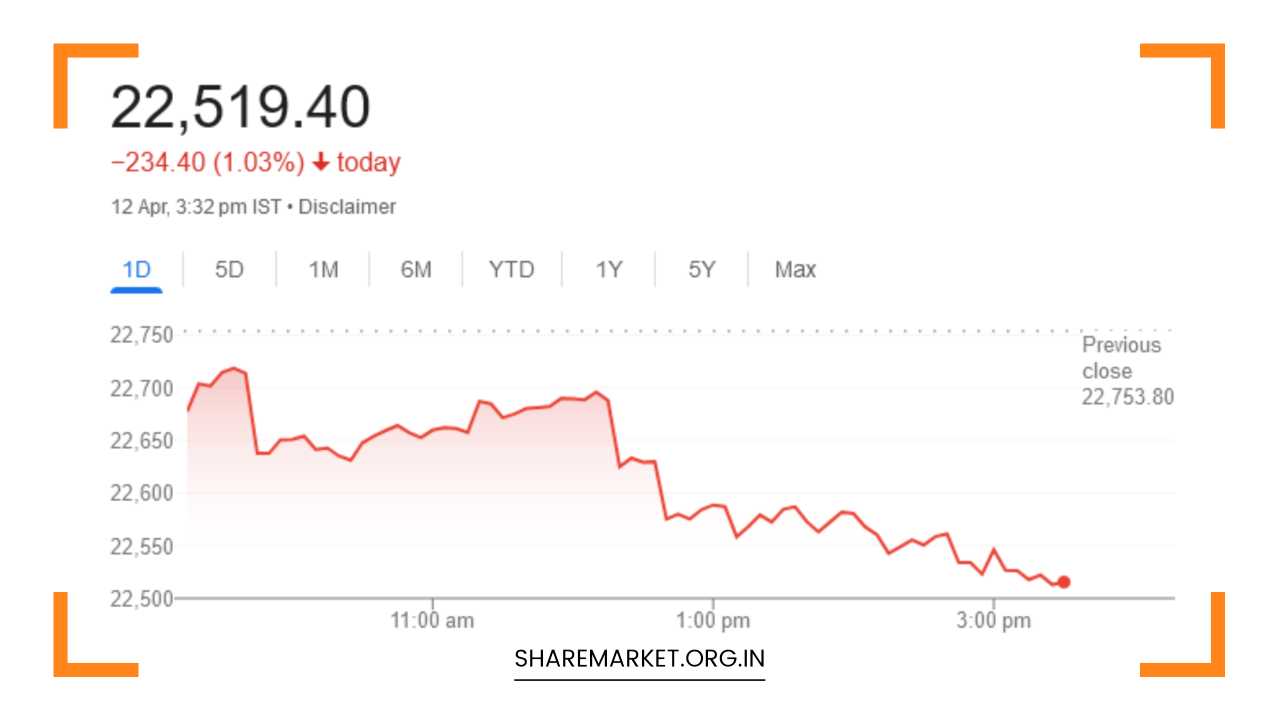Nifty Closed at 22,519; Nifty Prediction for Tomorrow

Nifty Prediction for Tomorrow
Stock Market at a Crossroads: Correction or Consolidation?
The Indian stock market has been on a record-breaking spree, seemingly scaling new heights every day. However, this relentless bull run appears to be encountering some headwinds.
The recent trading session witnessed a significant drop, with both the Sensex and Nifty closing over 1% lower.
This shift has sparked concerns about the market’s future trajectory: is a correction long overdue, or is this merely a period of healthy consolidation?
Profit-Taking and the Resistance Barrier:
Analysts attribute the decline to several factors. One significant contributor is likely profit-taking. After a sustained period of growth, some investors, particularly those who entered the market at lower levels, may be looking to lock in gains. This selling pressure can lead to temporary dips as supply outweighs demand.
Kunal Shah of LKP Securities highlights another factor: increased selling pressure in the Bank Nifty index. This could signal investor anxiety about a potential economic slowdown, with banks being particularly sensitive to such changes.
The Bank Nifty currently faces a crucial resistance level at 49,000. Successfully breaching this barrier could open the door for a further rise towards 50,000.
However, a failure to do so, coupled with a breach of the 48,000 support level, could trigger a more substantial sell-off.
This highlights the importance of technical analysis in gauging market sentiment and potential breakout or breakdown points.
Earnings Season and the Spotlight on Fundamentals:
With the release of TCS’s results, the much-anticipated Q4 earnings season has officially begun. This period is likely to see increased volatility as investors meticulously analyze individual company performance.
Upcoming results from Bajaj Auto, HDFC Life, and Infosys will be under close scrutiny. This shift in focus from headline news to company fundamentals is a crucial development.
Vinay Pahadia, CIO of PGIM India Mutual Fund, emphasizes that the market’s focus will shift towards a company’s cash flow and earnings potential.
Businesses demonstrating robust financials, a clear growth trajectory, and strong corporate governance are expected to benefit from favorable macroeconomic and demographic trends in India.
This renewed emphasis on company fundamentals is a positive sign for long-term investors, promoting a focus on value rather than pure speculation.
Navigating the Correction or Consolidation: A Look at Different Strategies
The nature of the current market movement remains a topic of debate. Sameet Chavan of Angel One suggests it could be either a “time-wise” or “price-wise” correction. A price correction could lead to profit-booking, particularly in mid- and small-cap stocks.
These segments often experience higher volatility compared to large-cap stocks. Investors with a higher risk tolerance may find opportunities in these sectors during a correction, but careful research and a strong understanding of the company’s fundamentals are crucial.
Conversely, a time-wise correction may see the benchmark indices remain range-bound while individual stocks continue to outperform based on their specific performance and growth prospects.
This scenario presents an opportunity for investors to adopt a more stock-specific approach, focusing on companies with strong fundamentals and positive outlooks, regardless of the broader market movement.
Beyond the Headlines: Global Factors at Play
It’s important to remember that the Indian market doesn’t operate in isolation. Global factors can also influence its trajectory.
Investors should stay informed about developments like rising interest rates in the US, geopolitical tensions, and fluctuations in commodity prices.
These factors can impact global liquidity and investor sentiment, potentially affecting the Indian market as well. For instance, rising interest rates in the US could lead to capital flight from emerging markets like India, putting downward pressure on stock prices.
Looking Ahead: A Measured Approach is Key
The coming weeks will be crucial in determining the market’s direction. The performance of the Bank Nifty and upcoming earnings reports will be key indicators.
Investors should closely monitor these developments and adjust their strategies accordingly. While some volatility is expected, a focus on strong fundamentals, disciplined trading, and a keen awareness of global factors can help investors navigate this evolving market landscape.
A Final Word: Importance of Diversification and Risk Management
Regardless of whether the market undergoes a correction or consolidation, diversification remains a key principle for investors.
Spreading investments across different asset classes like equities, fixed income, and real estate can help mitigate risk and smooth out portfolio returns.
Additionally, investors should employ sound risk management practices, such as setting stop-loss orders and maintaining a well-defined asset allocation strategy.
By adopting a cautious and well-informed approach, investors can navigate the current market uncertainty and position themselves to capitalize on future opportunities.

















